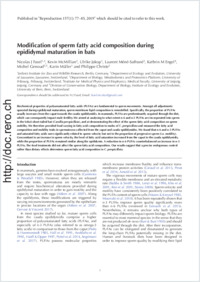Modification of sperm fatty acid composition during epididymal maturation in bats
- Fasel, Nicolas J. Leibniz Institute for Zoo and Wildlife Research, Berlin, Germany - Department of Ecology and Evolution, University of Lausanne, Lausanne, Switzerland
- McMillian, Kevin Department of Ecology and Evolution, University of Lausanne, Lausanne, Switzerland
- Jakop, Ulrike Leibniz Institute for Zoo and Wildlife Research, Berlin, Germany
- Mène-Saffrané, Laurent Department of Biology, Metabolomics and Proteomics Platform, University of Fribourg, Switzerland
- Engel, Kathrin M. Institute for Medical Physics and Biophysics, Medical Faculty, University of Leipzig, Germany
- Genoud, Michel Department of Ecology and Evolution, University of Lausanne, Lausanne, Switzerland - Division of Conservation Biology, Department of Biology, Institute of Ecology and Evolution, University of Bern, Switzerland
- Müller, Karin Leibniz Institute for Zoo and Wildlife Research, Berlin, Germany
- Christe, Philippe Department of Ecology and Evolution, University of Lausanne, Lausanne, Switzerland
-
01.01.2019
Published in:
- Reproduction. - 2019, vol. 157, no. 1, p. 77–85
English
Biochemical properties of polyunsaturated fatty acids (PUFAs) are fundamental to sperm movements. Amongst all adjustments operated during epididymal maturation, sperm membrane lipid composition is remodelled. Specifically, the proportion of PUFAs usually increases from the caput towards the cauda epididymidis. In mammals, PUFAs are predominantly acquired through the diet, which can consequently impact male fertility. We aimed at analysing to what extent n-6 and n-3 PUFAs are incorporated into sperm in the Seba’s short-tailed bat (Carollia perspicillata), and at demonstrating the effect of the sperm fatty acid composition on sperm mobility. We therefore provided food varying in fatty acid composition to males of C. perspicillata and measured the fatty acid composition and mobility traits in spermatozoa collected from the caput and cauda epididymides. We found that n-6 and n-3 PUFAs and saturated fatty acids were significantly related to sperm velocity but not to the proportion of progressive sperm (i.e. motility). Concomitant to an increase in sperm velocity, the level of fatty acid saturation increased from the caput to the cauda epididymidis, while the proportion of PUFAs remained similar along the epididymis. A reduction in n-6 PUFAs counterbalanced an increase in n-3 PUFAs. The food treatments did not affect the sperm fatty acid composition. Our results suggest that a precise endogenous control rather than dietary effects determines sperm fatty acid composition in C. perspicillata.
- Faculty
- Faculté des sciences et de médecine
- Department
- Département de Biologie
- Language
-
- English
- Classification
- Biological sciences
- License
- License undefined
- Identifiers
-
- RERO DOC 324645
- DOI 10.1530/REP-18-0463
- Persistent URL
- https://folia.unifr.ch/unifr/documents/307894
Statistics
Document views: 90
File downloads:
- men_msf.pdf: 108
